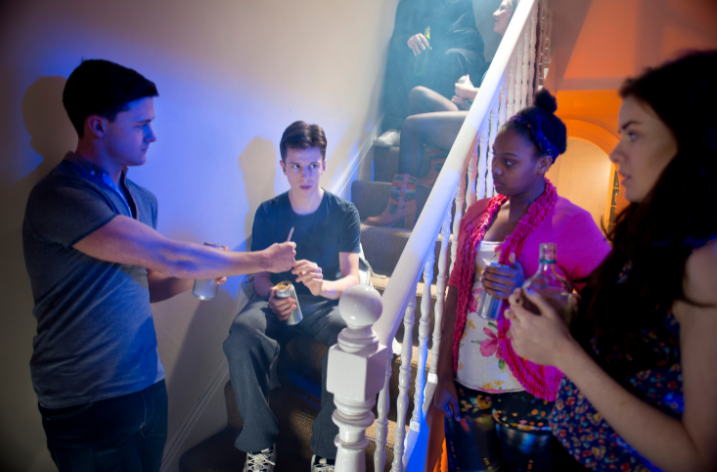by Lyndsey Burcina, Curriculum Developer & Program Coordinator, Metta Center for Nonviolence
Teen addiction rates are on the rise, and the cause can often be linked to the need for peer acceptance. Every day, youth between the ages of 11 to 18 are pressured by their peers to try something new. It used to be just alcohol and marijuana, but recently cocaine, LSD, and opioids have become more easily accessible to kids.
My experience with peer pressure and substance abuse is probably one of the most common. The summer before seventh grade I was hanging out with some friends from school. We were watching a movie in the garage when one of the boys pulled a joint out of his pocket. As the kids passed the joint around, I refused it twice until they started calling me a stuck-up wimp. They said I was too scared or too much of a goodie-goodie to smoke, so I gave in because I wanted to prove them wrong. I’m not sure why being a “good kid” bothered me so much, but it did, and people using that against me made me feel bad. For many, marijuana is a gateway drug. After that night, I knew that the only way to avoid the feeling of being different or isolated from the rest of the group was to force myself to do things I didn’t want to because that’s what the “cool kids” were doing. Soon I was drinking and smoking my way through seventh grade at concerts, parties, and the occasional school ditch day. That was the extent of my substance abuse until I turned 14 and someone brought cocaine to a sleepover. Coke was something I had only seen in movies or tv shows, so the fact that it was sitting in front of me felt strange. Two girls snorted the coke and asked me if I wanted any. My first response was no, but the girls started chanting “do it, do it, do it,” until I finally relented. I was hooked after my first try. For two and a half years my “friends” were feeding my addiction 3-5 times a day.
My rock bottom arrived in April of 2016. I had been hospitalized for multiple overdoses, had become dangerously anorexic, and burned a hole in the upper section of my septum. Having phased out of the “bad kids” group, I formed positive relationships with students in my restorative justice class. On April 22, 2016, they sat me down to express their concerns. They told me that they couldn’t sit by and watch me kill myself and that I was too special to lose. I denied having a problem for about an hour until it finally clicked how much I had hurt the people I loved most so I said okay. As hard as it was, I reluctantly but voluntarily went into treatment on May 2, 2016. I stayed there working a program with 12 other girls for 90 days, and for 90 days my friends, teachers, and family called me to tell me they were rooting for me. They helped me work on my self-confidence and become the Lyndsey I was meant to be. I have been sober since May 2, 2016 and if it were not for my peers holding a makeshift intervention, I probably would not be here today.
From my perspective on peer pressure, it takes multiple people and multiple comments to convince someone to do something they don’t want to do, but it takes only one person and one voice to speak up and point out that it’s wrong. It takes only one person to say “you don’t have to do it”, and to change someone’s mind. That voice could be what stands between a life full of love and opportunities and a life surrounded by jails, institutions and death. These are trying times for our youth. You can buy drugs and alcohol as easy as you can buy candy, so it is crucial that we not only make sure that our kids know that it’s okay to say no, but that they have the tools to speak up for themselves or someone else. We need to come together to support younger generations and let them know that it’s okay to resist doing something they aren’t comfortable with. This support and these skills save lives, just like my friends saved mine.
Lyndsey Burcina is a certified Restorative Practices trainer, speaker and radio show host, and is the Curriculum Developer & Program Coordinator with the Metta Center for Nonviolence in Petaluma, CA, building restorative justice and nonviolence curricula for youth and adults in Sonoma County schools. She served as a Safe School Ambassador beginning in 6th grade and throughout her middle and high school years.
